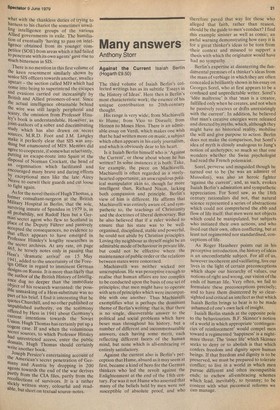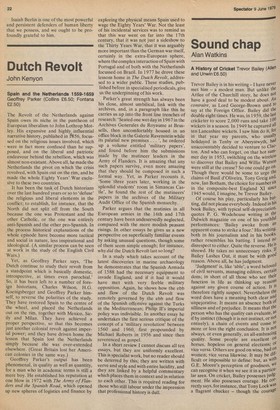Many answers
Anthony Storr
Against the Current Isaiah Berlin (Hogarth £9.50) The third volume of Isaiah Berlin's collected writings has as its subtitle 'Essays in the History of Ideas'. Here then is Berlin's most characteristic work; the essence of his unique contribution to 20th-century thought. His range is very wide; from Machiavelli to Hume; from Vico to Disraeli; from Herzen to Moses Hess. There is an admirable essay on Verdi, which makes one wish that he had written more on music, a subject which often appears in his early journalism, and which is obviously dear to his heart.
Is it Isaiah Berlin himself who is 'Against the Current', or those about whom he has written? In soine instances it is both. Take, for example, the piece on Machiavelli. Machiavelli is often regarded as a steelyhearted opportunist; an unscrupulous political manipulator akin to, though far more intelligent than, Richard Nixon, lacking both compassion and principle. Berlin's view of him is different. He affirms that Machiavelli was entirely aware of, and sympathetic to, the teachings of Christianity and the doctrines of liberal democracy. But he also believed that if a ruler wished to ensure that his state was to be wellorganised, disciplined, stable and powerful, he could not abide by Christian principles. Loving thy neighbour as thyself might be an admirable mode of behaviour in private life, but could not be effective where the maintenance of public order or the relations between states were concerned.
Machiavelli was neither wicked nor unscrupulous. He was perceptive enough to realise that human affairs are too complex to be conducted upon the basis of one set of principles; that men might have to operate with sets of principles which were incompatible with one another. Thus Machiavelli exemplifies what is perhaps the dominant theme of Berlin's writing: that is, that there is no single, discoverable answer to the political and social problems which have beset man throughout his history, but a number of different and incommensurable answers, each having some merit, each reflecting different facets of the human mind, but none which is all-embracing or entirely satisfactory.
Against the current also is Berlin's perception that Hume, absurd as it may seem at first, became a kind of hero for the German thinkers who led the revolt against the Enlightenment at the end of the 18th century. For was it not Hume who asserted that many of the beliefs held by men were not susceptible of absolute proof, and who therefore paved that way for those who alleged that faith, rather than reason, should be the guide to men's conduct? I find this example sinister as well as comic; an awful warning demonstrating how easy it is for a great thinker's ideas to be torn from -their context and misused to support a thesis with which the originator would have had no sympathy.
Berlin's expertise at disinterring the fundamental premises of a thinker's ideas from the mass of verbiage in which they are often concealed is brilliantly shown in his essay on Georges Sorel, who at first appears to be a confused and unpredictable writer. Sorel's `idee maitresse' is that `man is a creator, fulfilled only when he creates, and not when he passively receives or drifts unresistingly with the current'. In addition, he believed that man's creative energies were released and directed by myths, which, although they might have no historical reality, mobilise the will and give purpose to action. Berlin does not make the comparison, but Sorel's idea of myth is closely analogous to Jung's notion of archetypes; so much so that one wonders whether the Swiss psychologist had read the French polemicist.
Sorel, perverse and misguided though he turned out to be (he was an admirer of Mussolini), was also an heroic fighter 'against the current', and, as such, evokes Isaiah Berlin's admiration and sympathetic appreciation. For Sorel saw, as the 18th century rationalists did not, that natural science represented a series of abstractions which could not comprehend the ebb and flow of life itself: that men were not objects which could be manipulated, but subjects who initiated their own actions, and who lived out their own, often conflicting, but at least not regimented nor standardised, conceptions of life.
As Roger Hausheer points out in his perceptive introduction, the history of ideas is an uncomfortable subject. For all of us, however incoherent and vacillating, live our lives in the light of certain preconceptions which shape our hierarchy of values, our notions of right and wrong, our vision of the ends of human life. Very often, we fail to formulate these preconceptions precisely; and to have them disinterred by so clearsighted and critical an intellect as that which Isaiah Berlin brings to bear is to be made ashamed of one's own lack of insight.
isaih Berlin stands at the opposite pole to the behaviourists. B.F. Skinner's notion of a world in which appropriate 'contingencies of reinforcement' would compel men toward a regimented 'happiness' is a nightmare threat. The 'inner life' which Skinner seeks to deny or to abolish is that which confers freedom and dignity upon human beings. If that freedom and dignity is to be preserved, we must be prepared to tolerate conflict; to live in a world in which men Pursue different and often incompatible ends; to eschew all-embracing schemes which lead, inevitably, to tyranny; to be content with what piecemeal reforms we can manage. Isaiah Berlin is one of the most powerful and persistent defenders of human liberty that we possess, and we ought to be profoundly grateful to him.











































 Previous page
Previous page